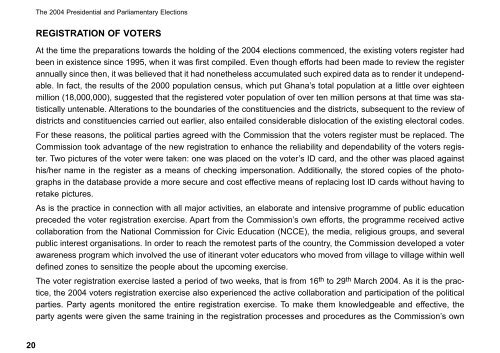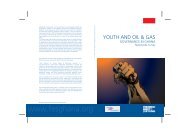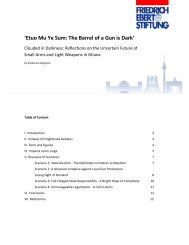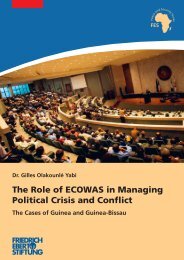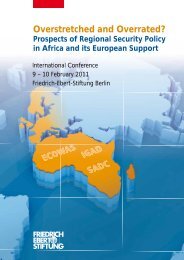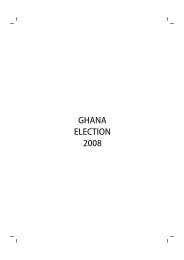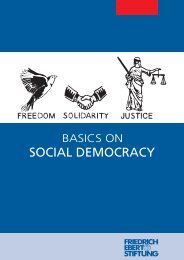Elections 2004 (Results) - Friedrich-Ebert-Stiftung, Ghana Office
Elections 2004 (Results) - Friedrich-Ebert-Stiftung, Ghana Office
Elections 2004 (Results) - Friedrich-Ebert-Stiftung, Ghana Office
You also want an ePaper? Increase the reach of your titles
YUMPU automatically turns print PDFs into web optimized ePapers that Google loves.
The <strong>2004</strong> Presidential and Parliamentary <strong>Elections</strong><br />
REGISTRATION OF VOTERS<br />
At the time the preparations towards the holding of the <strong>2004</strong> elections commenced, the existing voters register had<br />
been in existence since 1995, when it was first compiled. Even though efforts had been made to review the register<br />
annually since then, it was believed that it had nonetheless accumulated such expired data as to render it undependable.<br />
In fact, the results of the 2000 population census, which put <strong>Ghana</strong>’s total population at a little over eighteen<br />
million (18,000,000), suggested that the registered voter population of over ten million persons at that time was statistically<br />
untenable. Alterations to the boundaries of the constituencies and the districts, subsequent to the review of<br />
districts and constituencies carried out earlier, also entailed considerable dislocation of the existing electoral codes.<br />
For these reasons, the political parties agreed with the Commission that the voters register must be replaced. The<br />
Commission took advantage of the new registration to enhance the reliability and dependability of the voters register.<br />
Two pictures of the voter were taken: one was placed on the voter’s ID card, and the other was placed against<br />
his/her name in the register as a means of checking impersonation. Additionally, the stored copies of the photographs<br />
in the database provide a more secure and cost effective means of replacing lost ID cards without having to<br />
retake pictures.<br />
As is the practice in connection with all major activities, an elaborate and intensive programme of public education<br />
preceded the voter registration exercise. Apart from the Commission’s own efforts, the programme received active<br />
collaboration from the National Commission for Civic Education (NCCE), the media, religious groups, and several<br />
public interest organisations. In order to reach the remotest parts of the country, the Commission developed a voter<br />
awareness program which involved the use of itinerant voter educators who moved from village to village within well<br />
defined zones to sensitize the people about the upcoming exercise.<br />
The voter registration exercise lasted a period of two weeks, that is from 16 th to 29 th March <strong>2004</strong>. As it is the practice,<br />
the <strong>2004</strong> voters registration exercise also experienced the active collaboration and participation of the political<br />
parties. Party agents monitored the entire registration exercise. To make them knowledgeable and effective, the<br />
party agents were given the same training in the registration processes and procedures as the Commission’s own<br />
20


